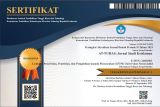Reformulation of Mafqud Husband Regulations in the Indonesian Marriage Law System in the Perspective of Maslahah Al Buthi
(1) * Miftakur Rohman


 (Universitas Islam Negeri Maulana Malik Ibrahim Malang)
(Universitas Islam Negeri Maulana Malik Ibrahim Malang) Indonesia
(2) Tutik Hamidah (Universitas Islam Negeri Maulana Malik Ibrahim Malang)
Indonesia
(3) Khoirul Hidayah (Universitas Islam Negeri Maulana Malik Ibrahim Malang)
Indonesia
(*) Corresponding Author
AbstractOne of the issues that often arises in the context of marriage is the case of "missing husband/wife."This term refers to a situation where the husband is absent or not present in the household for a long time, causing the marriage to be halted or threatened.In the Indonesian marriage law system, this issue refers to UUP No. 01 of 1974 Article 39 and KHI Article 116 point b.This type of research is normative with a legal, comparative, and conceptual approach.This research examines the urgency of reformulating the provisions for a missing husband in the Indonesian marriage law system through the perspective of maslahah al-Buthi.The analysis shows that the two-year waiting period as regulated in KHI Article 116 b and UUP No. 01 of 1974 Article 39 creates serious legal uncertainty for the wife and children, negatively impacting inheritance rights, economic and psychological well-being, and violating the principle of distributive justice.Based on the principle of maslahah al-Buthi, it is recommended to reduce the waiting period to one year to expedite dispute resolution and minimize harm.This reformulation aligns with the goals of national law—human rights protection, gender justice, and legal certainty—while creating synergy between progressive Islamic legal values and modern norms.The implementation of this proposal is expected to achieve a faster determination of marital status, improve economic access for wives, and prevent family poverty, thereby supporting the attainment of family welfare and harmony.
|
Keywords
Mafqud Husband; Indonesian Marriage Law; Maslahah Al-Buthi; Legal Reform
Full Text: PDF
Refbacks
- There are currently no refbacks.
Copyright (c) 2025 Miftakur Rohman, Tutik Hamidah, Khoirul Hidayah
This journal is licensed under a
Creative Commons Attribution-ShareAlike 4.0 International License





.png)







